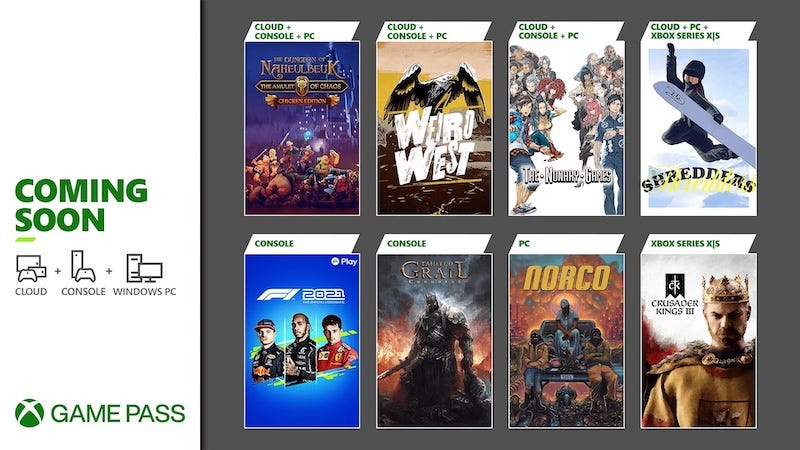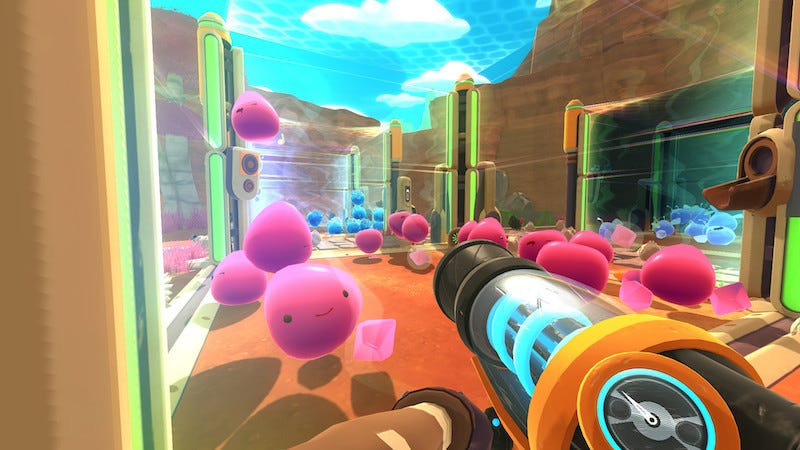Trending
Opinion: How will Project 2025 impact game developers?
The Heritage Foundation's manifesto for the possible next administration could do great harm to many, including large portions of the game development community.

Featured Blog | This community-written post highlights the best of what the game industry has to offer. Read more like it on the Game Developer Blogs or learn how to Submit Your Own Blog Post
Game discovery—it's "bear-ly" an inconvenience.

[The GameDiscoverCo game discovery newsletter is written by ‘how people find your game’ expert & company founder Simon Carless, and is a regular look at how people discover and buy video games in the 2020s.]
Joyous Monday! The lead story today completes a trilogy that started with whether Xbox really intended to slice up platform cut as it doubled down on Game Pass. It continued by discussing if supply & demand mismatches were making PC/console games a trickier place to be of recent.
Now there’s a (slightly garbled) claim that Oddworld: Soulstorm’s PlayStation+ deal had a “devastating” effect on the game’s non-sub sales. If the game didn’t sell outside of PS+ or on Xbox, maybe it’s a larger supply/demand issue. And the PS+ ‘free’ effect wasn’t that direct? But still - the market is changing! Let’s explore this trilogy ender…

Back in January, just after the Microsoft buying Activision Blizzard news hit, I spotted a Twitter thread from Spry Fox CEO and co-founder David Edery. I’ve known David for nearly 20 years, from back when he was game portfolio manager of digital console distribution pioneer Xbox Live Arcade in the mid-’00s.
David and Daniel Cook founded Spry Fox in 2010, & they’ve made games like Cozy Grove, Triple Town, the Alphabear series, and worked with funders like Apple, Snapchat, and now Epic, which is publishing their next game. (Did you know that Triple Town pioneered the ‘merge’ mechanic making billions on mobile, btw?)
Anyhow, back in January, I caught up with David on this - who intriguingly has co-run Spry Fox as a remote-only studio since its very beginning. We expanded the conversation past the original thread into this chat about the rise of subs & its ramifications:
David: None of [these trends] are a surprise. As soon as Game Pass became a success and MS started gobbling up studios, the future was set in stone. Services like Apple Arcade and Netflix's new games offering are just fuel on the fire.
The future for most indies, especially those who like making paid (not F2P) games, will be earning a comfortable living making games for subscription services who own everything. Zero chance of earning a massive profit, though to be fair, the chances have never been high.
This isn't necessarily a bad thing. The people who make content for Netflix really seem to enjoy doing so. But it's a major change, with huge repercussions for how studios evolve and what types of games get made in the future.
And of course, many aspiring devs will be unable to sign deals and thus find themselves shut out of the market. It may start to feel more like the old retail days of the game biz, when breaking in was incredibly difficult. Then again, at least F2P serves as a counterbalance.
If you doubt any of this, ask yourself how much music you've bought recently, or how many movies you've decided to rent or see in theater vs. just watching what's available to you on various services. If you're like most people, ~99% of your linear media time is ad or sub-based.

Simon: So do you think for some prominent indies, a subscription era for premium games will be more stable? And uhh, what happens to premium game publishers, long-term? Are they still of value to platforms because it's easier to do group deals and they are more reliable, or will they be partially disintermediated?
David: For some indies, things will probably be more stable. I struggle to predict what will happen to premium game publishers. I assume the bigger/older ones will probably be fine, because their IP is valuable. I'm not sure what happens to the very small ones.
Also, there is of course the huge question of what Valve and Epic are going to do? You really can't count those companies out, especially Valve with regard to Steam. The folks at Valve are smart, they have a huge and relatively loyal customer base, and they have tons of money, obviously.
So I wonder how long they can help preserve the premium game sales space in its current form, or if they will eventually capitulate and create their own sub?
The problem with trying to make predictions about things like this is that change sometimes takes a lot longer than people think it will. I'm guessing this is going to be a very slow process. I think about my own media consumption habits, and how I had a Netflix subscription for an extremely long time, while still going to movie theaters and stuff like that.
It took the rise of stuff like Disney+ and the pandemic to finally make me adopt multiple subs and stop watching content from other sources. I wouldn't be surprised if it took 10 or 15 years before you started to see a large segment of the population stop paying for most premium games in favor of subs.
BTW, another really interesting question about this: to what extent do multiplayer games help counteract this trend? And do those multiplayer games absolutely need to be ‘free to play’ to to succeed outside a sub going forward?
Simon: It's not clear. I think GaaS co-op games are a good thing to do outside of sub services - certainly better than finite single player games. Just in terms of the way they market themselves to players, and especially streamers.

Simon: Right now there's a space for PC and console games that are GaaS-ish but don't really mess much with microtransactions, like Subnautica or Slime Rancher.
Do you think that space will exist in the future, or will games that get updated constantly for years all get more aggressive monetization added? (In part because the full version is available in subscription services, and they want some upsell.)
David: The subscription services really want popular games that get updated forever. They'll be paying people to make those. I don't think I can predict how many of those devs will start to aggressively monetize outside of the sub service. In part because I can't predict if or when the sub services will start to make total exclusivity a mandatory part of their dev deals.
F2P is the obvious "out" for any dev who wants to sidestep all this. And yeah, maybe we also see a phase where "GAAS-ish" games start to look more and more like F2P, but without jumping all the way. (For example: downward price pressure on the base SKU; charging for updates that previously would have been free and/or offering ‘optional’, but highly desirable content for $; etc.)
I think it's worth repeating that change of the type we're talking about usually ends up happening somewhat slower than pundits like to predict. It will be a gradual thing, punctuated by occasional controversy when one of the subs changes their policies in a major way and announces it publicly - or the change gets leaked by a dev.
Simon: Makes sense! Right now there's quite a lot of AAA-adjacent GaaS games who benefit from being in Game Pass and other services with their base game for a while (but rotating in and out.) That way, it gets them a burst of new players who will spend more money on upgrades - IAP, DLC, etc. - over time.
But it’s not always just the base version of the title. E.g. ARK: Ultimate Survivor Edition just came to Game Pass, when previously just the base game was available. But those are existing hit games, rather than games explicitly commissioned by the service. And this shows the complexity at play here - there’s no ‘one size fits all’ solution. And it’s all part of these multi-faceted, incremental long-term trends.
[We’re GameDiscoverCo, an agency based around one simple issue: how do players find, buy and enjoy your premium PC or console game? We run the newsletter you’re reading, and provide consulting services for publishers, funds, and other smart game industry folks.]
Read more about:
Featured BlogsYou May Also Like